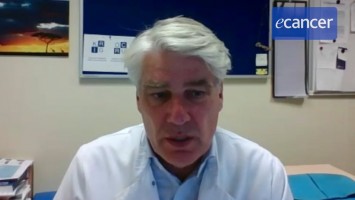Penpulimab in combination with chemotherapy for metastatic nasopharyngeal cancer shows positive results
Dr Aditya Shreenivas - City of Hope, Duarte, USA
My study was penpulimab with chemo versus chemo with placebo. It’s a double-blind randomised phase III study, AK105-304, looking at penpulimab and chemo combination versus chemo and placebo combination in first-line recurrent metastatic nasopharyngeal carcinoma. The study led to FDA approval for penpulimab in the first-line setting in nasopharyngeal carcinoma.
What was the study design?
It was a randomised phase III double-blind study with 1:1 randomisation. 291 patients were initially identified, 147 were enrolled in the chemotherapy and placebo arm and 144 in the penpulimab and chemotherapy arm. The study at this point of time has presented PFS data and overall survival data is still being evaluated, it’s immature right now. Essentially a randomised phase III double-blind 1:1 randomisation.
What were the results of this study?
The most important primary endpoint was met. The median PFS from blinded independent central review was 9.6 months in the experimental arm, which consisted of penpulimab and chemotherapy, and it was, I would say, around 7 months in the placebo with chemotherapy arm. Apart from that the overall survival data is still pending.
What is the significance of these results?
There are limited treatment options for the recurrent metastatic setting for nasopharyngeal carcinoma, especially in the first-line space. At this point only toripalimab, based on the JUPITER-02 study, is approved in the United States so this provides another option for patients. Secondly, penpulimab, because of its unique mechanism of action of Fc-null design, it leads to lesser immune-related adverse events. So, again, with the study we saw that the adverse events were lower than some of the other studies in this space. So it provides a safe first-line option and a second option in the recurrent metastatic space.
Is there anything else you would like to add?
In future, as I mentioned, overall survival data, once it’s mature, will be published. We would also be looking at some of the other endpoints like looking at the benefit across different populations, looking at doing some sub-analyses of patients that had liver metastases, bone metastases and others. Because of its unique design, it does provide a safe option in the first-line setting.
This study was funded by Akeso Bio, a company based in China, and this was truly a global study which had 36 sites in China and 10 sites outside of Asia.








